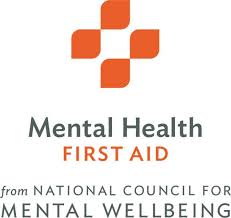What You Learn
Topics Covered
- Depression and mood disorders
- Anxiety disorders
- Trauma
- Psychosis
- Substance use disorders
Mental Health First Aid also emphasizes recovery and resiliency — the understanding that individuals facing these challenges can improve, heal, and draw on their strengths to maintain wellness.
The Mental Health First Aid Action Plan
Warning signs of suicide may include:
- Threatening to hurt or kill oneself
- Seeking access to means of self-harm
- Talking or writing about death, dying, or suicide
- Expressing feelings of hopelessness
- Acting recklessly or engaging in risky behavior
- Increased use of alcohol or drugs
- Withdrawing from family, friends, or social activities
- Showing agitation, anger, or irritability
- Experiencing a sudden or dramatic change in mood
Types of Professionals:
- Doctors (primary care physicians or psychiatrists)
- Social workers, counselors, and other mental health specialists
- Certified peer specialists
- “Talk” therapies
- Medication
- Other professional supports
- Exercise
- Relaxation and meditation
- Participation in peer support groups
- Self-help books (such as those based on CBT)
- Connecting with family, friends, faith communities, and other social networks
Interventions Learned
- Panic attacks
- Suicidal thoughts or behaviors
- Nonsuicidal self-injury
- Acute psychosis (e.g., hallucinations or delusions)
- Overdose or withdrawal from alcohol or drug use
- Reactions to a traumatic event
Practical exercises, such as role plays, scenarios, and interactive activities, help you confidently apply these skills in real-life situations.
What You'll Gain
- Certification: Earn a 3-year valid certification upon completing our 7-hour training.
- Expert Instruction: Learn directly from a certified mental health professional with extensive experience in adult mental health.
- Engaging Experience: Participate actively with your webcam and microphone throughout the session for a fully interactive and immersive learning environment.
